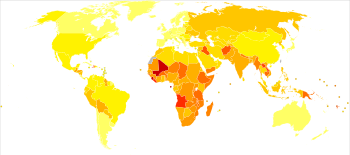- Nutrition disorder
-
Nutrition disorder Classification and external resources MeSH D009748 Nutritional diseases are diseases in humans that are directly or indirectly caused by a lack of essential nutrients in the diet. Nutritional diseases are commonly associated with chronic malnutrition. Additionally, conditions such as obesity from overeating can also cause, or contribute to, serious health problems. Excessive intake of some nutrients can cause acute poisoning.
Contents
Overnutrition
Main article: OvernutritionMetabolic
Obesity is caused by consuming too many calories compared to the amount of exercise the body is performing, causing a distorted energy balance. It can lead to diseases such as cardiovascular disease and diabetes. Obesity is a condition in which the natural energy reserve, stored in the fatty tissue of humans and other mammals, is increased to a point where it is associated with certain health conditions or increased mortality.
The low-cost food that is generally affordable to the poor in affluent nations is low in nutritional value and high in fats, sugars and additives. In rich countries, therefore, obesity is oftentimes a sign of poverty and malnutrition while in poorer countries obesity is more associated with wealth and good nutrition. Other non-nutritional causes for unhealthy obesity included: sleep deprivation, stress, lack of exercise, and heredity.
Acute overeating can also be a symptom of an eating disorder.
Goitrogenic foods can cause goitres by interfering with iodine uptake.
Vitamins and micronutrients
Vitamin poisoning is the condition of overly high storage levels of vitamins, which can lead to toxic symptoms. The medical names of the different conditions are derived from the vitamin involved: an excess of vitamin A, for example, is called "hypervitaminosis A".
Iron overload disorders are diseases caused by the overaccumulation of iron in the body. Organs commonly affected are the liver, heart and endocrine glands in the mouth.
Deficiencies
Main article: Malnutrition Disability-adjusted life year for nutritional deficiencies per 100,000 inhabitants in 2002. Nutritional deficiencies included: protein-energy malnutrition, iodine deficiency, vitamin A deficiency, and iron deficiency anaemia.[1]
Disability-adjusted life year for nutritional deficiencies per 100,000 inhabitants in 2002. Nutritional deficiencies included: protein-energy malnutrition, iodine deficiency, vitamin A deficiency, and iron deficiency anaemia.[1] no dataless than 150150-300300-450450-600600-750750-900900-10501050-12001200-13501350-15001500-1750more than 1750
no dataless than 150150-300300-450450-600600-750750-900900-10501050-12001200-13501350-15001500-1750more than 1750Proteins/fats/carbohydrates
Dietary vitamins and minerals
- Calcium
- Iodine deficiency
- Goiter
- Selenium deficiency
- Iron deficiency
- Zinc
- Growth retardation
- Thiamine (Vitamin B1)
- Niacin (Vitamin B3)
- Vitamin C
- Vitamin D
Complex disorders
In some cases, eating too much of one thing can induce an apparent deficiency of something else. A common example occurs when livestock eat locoweed: locoweed contains a toxin that inhibits enzymes, simulating a deficiency of the enzymes.
Foot notes
- ^ "Mortality and Burden of Disease Estimates for WHO Member States in 2002" (xls). World Health Organization. 2002. http://www.who.int/entity/healthinfo/statistics/bodgbddeathdalyestimates.xls.
- ^ "Malnutrition Is Cheating Its Survivors, and Africa’s Future" article in the New York Times by Michael Wines, December 28, 2006
See also
- Avitaminosis
- Malnutrition
- Essential nutrient
- List of ICD-10 codes (E54-E64) -- detailed taxonomy
- Obesity
- Osteoporosis
Pathology: Medical conditions and ICD code (Disease / Disorder / Illness, Syndrome / Sequence, Symptom / Sign, Injury, etc.) (A/B, 001–139) Infectious disease/Infection: Bacterial disease (G+, G-) · Virus disease · Parasitic disease (Protozoan infection, Helminthiasis, Ectoparasitic infestation) · Mycosis · Zoonosis(C/D,
140–239 &
279–289)Cancer (C00–D48, 140–239)Myeloid hematologic (D50–D77, 280–289)(E, 240–278) (F, 290–319) (G, 320–359) (H, 360–389) (I, 390–459) (J, 460–519) (K, 520–579) Stomatognathic disease (Tooth disease) · Digestive disease (Esophageal, Stomach, Enteropathy, Liver, Pancreatic)(L, 680–709) (M, 710–739) (N, 580–629) Urologic disease (Nephropathy, Urinary bladder disease) · Male genital disease · Breast disease · Female genital disease(O, 630–679) (P, 760–779) (Q, 740–759) (R, 780–799) (S/T, 800–999) Nutrition disorders (E40–E68, 260–269) Hypoalimentation/
malnutritionB1: Beriberi/Wernicke's encephalopathy (Thiamine deficiency) · B2: Ariboflavinosis · B3: Pellagra (Niacin deficiency) · B6: Pyridoxine deficiency · B7: Biotin deficiency · B9: Folate deficiency · B12: Vitamn B12 deficiencyOther
vitaminsA: Vitamin A deficiency/Bitot's spots · C: Scurvy · D: Hypovitaminosis D/Rickets/Osteomalacia · E: Vitamin E deficiency · K: Vitamin K deficiencyHyperalimentation Mineral overloadsee inborn errors of metal metabolism, toxicityM: NUT
cof, enz, met
noco, nuvi, sysi/epon, met
drug(A8/11/12)
Categories:- Dietetics
- Nutritional diseases
- Lists of diseases
Wikimedia Foundation. 2010.
